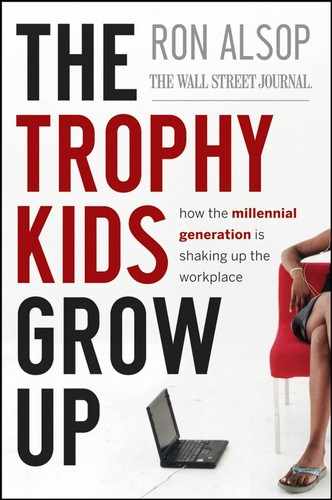Chapter 9. Recruiting in Cyberspace
When most young people log on to You Tube, the hugely popular video-sharing Web site, they're apt to watch the new Mariah Carey music video, a popular skit from Saturday Night Live, or the latest scrappy political debate.
What they're seeking is entertainment, not a new job. But KPMG, the global auditing firm, hopes to change that. Now You Tube visitors also can look for a job by taking a peek at KPMG Go, a college recruiting channel developed expressly for the video-driven millennial generation. It may not be able to compete for attention with Mariah Carey and Barack Obama, but KPMG's You Tube channel is still a highly significant development that may well represent the future of college recruiting.
Companies must meet millennials on their own turf, and today that usually means not on campus but rather somewhere in cyberspace. What better place than You Tube, KPMG's recruiting managers figured. "We needed a fresh, new way to break through the clutter," says Shawn Quill, marketing account executive for campus recruiting. "In our focus groups with students, we found that YouTube was the most visited, most influential site. This generation grew up with video games and hundreds of cable TV channels; they expect to be entertained when they're being informed."
Videos on KPMG Go focus heavily on the personal experiences of both new and veteran employees. By presenting the career journeys of more seasoned employees, the firm aims to impress millennials with the message that they can build a long career filled with global opportunities.
In one of the short clips, an intern named Manny, who is starting his first day at KPMG in Shanghai, says he's excited about his new job because "I've spent enough time thinking global; it's time for action." But he adds that he also is feeling awfully hot in his business suit and tie on the streets of sweltering Shanghai. In another video clip, a managing partner talks about the firm's community service and his own involvement with the Boy Scouts of America in San Francisco.
The KPMG Go channel also links to a KPMG magazine for students and to the careers section of the firm's own Web site, which includes an interactive tool that matches college majors to different practices at the firm. Enter mathematics as your major, and the site informs you that you could do economic and valuation services or financial risk management.
KPMG Go wasn't exactly an overnight sensation with only about 12,000 channel views in its first few weeks. But as one of the first recruiters to try YouTube, KPMG expects awareness of its channel to increase steadily.
Like KPMG, more companies are realizing that they must go beyond formulaic recruiting techniques if they hope to generate any buzz with this generation of students. As competition for the most talented millennials has intensified, the old tried-and-true hiring strategies simply aren't working as well anymore. Merely inviting students to corporate presentations and cocktail parties won't command the attention of the techobsessed millennials. In fact, nearly two-thirds of the M.B.A. recruiters in a 2007 Wall Street Journal/Harris Interactive survey said that to attract top job candidates, they must resort to new tactics, ranging from searching online resume databases to joining social networking sites.
Beyond helping them reach millennials, innovative recruiting strategies can lend companies an image of being cool and on the cutting edge. International Business Machines Corp., which recruits at more than 100 U.S. universities, is planning to increase its online recruiting activities, particularly for its Extreme Blue internship program. For example, the company is setting up meeting spaces and islands in Second Life, a virtual community, for a variety of events, including coffee talks, recruiter question-and-answer sessions, educational lectures, and online interviews. Students would log on, create avatars to physically represent themselves, and then visit IBM Island. Senior business leaders, engineers, and inventors, who often can't travel to campuses and job fairs because of work demands, also would be able to participate in such virtual events. "Technology is part of the DNA of today's younger generation," says Karen Calo, IBM's vice president for global talent. "They're naturally attracted to things like Second Life and expect IBM as an innovative company to be there."
Of course, companies should realize that their recruiting pitches in cyberspace will not be accepted at face value. Millennials won't settle for the company line on corporate Web sites and social networking pages. They are avid information seekers and will scour the Internet for unfiltered opinions of potential employers. If millennials Google the name of most organizations, from KPMG to the U.S. Army, they are sure to find a plethora of critical news articles and blog postings. Run an Internet search of KPMG, for instance, and numerous references to its much-publicized tax shelter fraud scandal pop up. And an Army search turns up antiwar sites that question the military's performance in Iraq and show horrific images of Americans maimed in battle and prisoners abused by soldiers at the Abu Ghraib prison. Companies can't hide from publicity about negative events. But they can ensure that their online recruiting messages are credible, and they can assertively respond to inaccurate and reputation-damaging Internet gossip.
